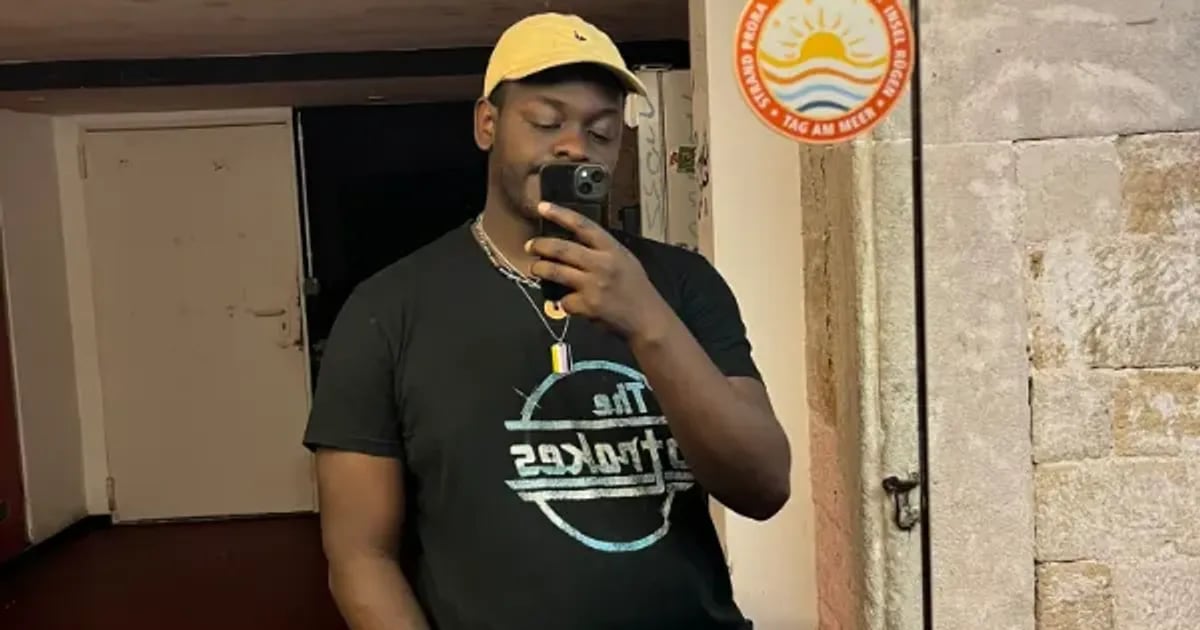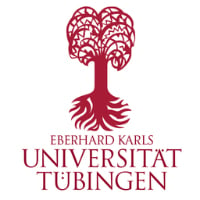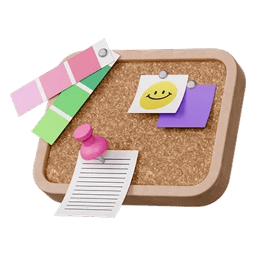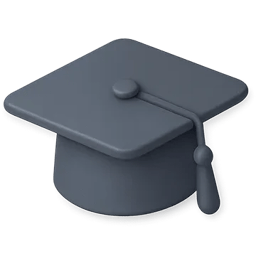Meet Rahim! If his laugh was a household appliance it would be a washing machine. He is unusually talented in that he can find the time signature to any song. Rahim would confidently put all his trust into Penne Rigate (yes, the pasta), to file his taxes. If he were to describe his sense of humor as a holiday decoration, he would pick a novelty snow globe, and his favourite weird food combination is jam toast with sausages. Rahim’s story is a fascinating one, from unique-to-Germany application procedures, to Covid’s effect on the university experience, to his pivotal change in major. So dive in, learn, and enjoy!
- Journalist’s note <3
Introduction
I’m Rahim Kariuki, and I’m 24 years old. I've been in Germany for four and a half years, and I am enrolled in Eberhard Karls University of Tübingen. I was studying nursing at first, and then I changed my major from nursing to history with a minor in political sciences. That's the angle my studies have taken on right now. History has always been my passion, and something that even at the start I wanted to study. But I did take up medicine, or rather nursing instead, because History inherently did not appear to be an investment that guaranteed a as secure future as compared to medicine. So there was definitely that pressure from home to go into a field in which professions and jobs were more solid, which is why I studied nursing. In my mind I thought to myself that I could always take up history when I was done. However, towards the end of the 4 years, not passing my exams was kind of like a wake up call for me, that nursing wasn’t for me and I wanted to study something else. So I dropped nursing, and picked history. I’m currently in my first year.

Background
I grew up in Nairobi, and completed my high school education at German school from 2012 to 2020. After I graduated I moved straight to Germany. I live in Tübingen, It's a small university city about an hour away from Stuttgart. I'd say I'm fluent in German, definitely C1 if anything. Well, I don't live in a place where they speak proper German, we speak a lot of Swabian German here, so my German is not exactly standard German, but it's kind of like it. When I moved to the German School Nairobi, I actually had no background in the language at all. I had been going to Makini High School and my parents did not really like it, so they had been looking for other options. They heard about the beginners scholarship that the German School Nairobi was offering, which is really exactly what it sounds like, no language proficiency level requirements were needed. So we applied for it and honestly it was a really fun experience. I remember my dad teaching me how to say “Guten Morgen” in the car as we headed for the ceremony, right before I joined the school. My parents thought it would be a good opportunity to try something new, I was both skeptical and excited about it!
Why Germany?
The fact that I went to German School definitely made the transition easier. I remember towards the end of high school, we went to Germany as a class, what we call a study trip. We spent one week at a vocational school In northern Germany and then spent another week at a university In southern Germany. One of the best trips of my life honestly. Over and above that, they did go out of their way to make sure that Germany was a university destination that we would seriously consider, which was pretty great. I'm currently what they call an Ausbildungslerner, basically an educational resident. They don't give me German benefits or whatever, except for the fact that everything to do with signing up for the school or signing up for college, all those things happen the same way it happens for Germans. Choosing Germany seemed like the perfect choice because it was relatively cheaper than other destinations like say the UK for example, and natürlich I also have the language as an advantage.
When I was drawing up options, I considered Trinity College in Dublin for a while because I really like Irish culture, and by Irish culture I mean the anti-colonialist aspect of it. Naturally I also considered Austria and Switzerland, because of the language. I wanted to study medicine initially, and I didn't get the grades required to do so, but there are private schools in those countries that would have allowed me to do so. Other than that, the only other schools that I really gave serious thought to were UCLA and NYU. At the end of the day, Germany ended up being the core country that I ended up focusing on. I applied to a bunch of different universities and Tübingen was the very first university to give me an acceptance letter. At this time, the COVID lockdown had started to become serious, and leaving the country was not the easiest procedure. Since I had a preliminary letter and a place to go, I decided to take it and go as early as I could.

Abitur (My Stats)
My high school, German School Nairobi, was a bilingual school, so a bunch of courses were done in English and others in German. The Abitur itself, that's what the exam was called, was an international one. The international German Abitur is pretty unique, but the core of it would be that it combines the German traditional exam with the country that it's in. My high school was really small. It had, I think, 700 people altogether. So because of that we didn't have all the courses they offered in Germany, say something like politics. We also didn't have any specialized subjects that most people have right now. We just had what we call the basic subjects and we kind of ran with those. So the Abitur was my final high school exam, and once I got my results I was good to go.
Extracurriculars
My main extracurriculars were sports, music and MUN. I was in the basketball team and the volleyball team for the larger part of high school, as well as the football team and the swim team for a short period of time. For music, I was in a band, as a singer and a lead guitarist. We tried doing a musical before COVID hit but sadly that never ended up going anywhere. I did MUN for 5 years in total. 3 years of MSMUN and 2 years of EAMUN. A lot of my achievements, a lot of the things I want to do in university did come from MUN, so it's one of the most, if not the most impactful extracurriculars that I did. I was a delegate once, an ambassador 4 times, and a Junior Chair twice. In my last year I won the best resolution award, and was shortlisted for best speaker! MUN was where I really found my footing as a person, so I really did enjoy it. I did art and debate for a while too, but in the end I chose to just really stick to what I was familiar with, what I was good at.
Application process? Tedious, but rewarding.
The application process was different across the course I would be applying for, because I was applying for both nursing courses and history courses. Most times I was required to write a motivation letter and other times they wanted a cover letter, or a CV. Then naturally I also need to have my certificates and accolades and all that. I think applying for history was easier in comparison to nursing. For nursing, you'd need to have more accreditation, even a certificate of conduct! So I had to go to the DCI (Directorate of Criminal Investigations Kenya), to get that before I could start applying for nursing courses. Most of the stuff I was writing in the letters was basically my reasoning for why I wanted to do that particular course, a lot like a pitching letter. The entire application process took me about two weeks. Around the time I was beginning to apply in earnest;. I'd already done my birthday. So it was like after that, I had to start getting things in order. I had to describe my motivation for doing the course, nursing. I explained how I’d always wanted to help people, that I wanted to be able to understand why people were suffering and how to make sure it could be contained and treated. I wrote about how this particular passion to help people is what motivated me throughout school, and what drew me to decide to study at that particular university. Naturally I’d also talk about my background, if I had any relevant experiences , more about why I chose that university, and that was pretty much it!
Other than being stuck at home writing letters all day, I also took a unique German Differential Aptitude Test (DATS) online. It was called "Was soll ich studieren?" It’s a German state questionnaire, but whether you need to take it or not also really just depends on the state that you're studying in. In the state that I'm in, Baden-Württemberg, it is important. It is actually paramount that you take that test before you can apply to university. They also use it to gauge whether or not you will actually pull through in that course. It's pretty easy. It's an assortment of personality questions, and interest quizzes. Essentially, it's a questionnaire designed for kids who are just coming out of high school, to help them choose a career path that would be a good fit for them.
Mentorship
I did not use any mentorship services during my application process or anything like that. I grew up in a home where we were always encouraged to do stuff on our own, you know, try, fail, then can look for help , that sort of mentality. The process wasn't too stressful though. I was really just at home on my laptop, writing letters all day. The most stress I had was pushing myself to meet the application deadlines.
Tuition fees
The cost of attendance for this school really just depends on your course and lifestyle. The school fees themselves aren't very expensive, whereas upkeep is a bit more expensive. My Tuition fees are around 300 euros per semester, so approximately 900 euros yearly. Upkeep is a bit more pricey. On my end I spend around 900 euros monthly, but that’s largely influenced by the place I live in, the kind of stuff I buy, the places I go to and all that. Lifestyle, like I’d mentioned before.
I do not have a scholarship, nor do I receive financial aid. I’m currently in the process of applying for a special program, that’s not technically a scholarship, but has many similar benefits. It would allow me to study for a year in France, in Marseille, and I would receive a stipend of around €5,000 over the course of time that I would be there!
Visa application
The process of getting a visa from what I've heard is insanely different these days than it was for me. Basically, the main reason why I was really stressed out about deadlines was because during COVID, the only way you'd be allowed to fly out of the country was on a Student Visa. You couldn't even use a vocational training visa, it had to be a student visa. I also had a few issues with my passport, but as soon as the issues were clear, and as soon as I had all my documents, I dropped them off then I was invited for an interview after my documents had been reviewed. They got back to me, thank God, in like a week and told me my visa was ready, and I could go pick it up. And then that was it! It was very streamlined, so I didn’t experience any major hitches in the process.
Beyond the Classroom
Recently, outside class, I've been making food quite a bit. I'm working eight hours, that is to say, five to eight hours a week. I also DJ so sometimes my weekends are spent DJing with my friends and making music at events. Generally I think most of my life revolves around working and Uni, so there's not much to what I’m doing outside of class.
Work-life balance
When I was studying nursing I was being paid, I used to get 450 euros which wasn't really a lot at the beginning. Later on at some point in 2023 I started getting paid 900 to 1000 euros a month, which made my work-life balance so much easier. Because of that I didn't really need another job, I just had to study, that's it. So I would study and the extra time I had I’d spend working and hanging out with friends so it was much more relaxed. The problem comes in when your course doesn't really pay you for what you're doing; you end up spending a bit more time working and a little less time studying, which is a foolproof recipe for your work-life balance becoming really skewed. My nursing course was what you call a dual study course or a dual studium in German. It's when you're basically both working and studying as part of your course. So, for example, part of my nursing studies required me to be working at the hospital or at the care home or at the at-home care services for about six to eight weeks per semester. And so what they would do is for those hours I would be working, at the end of the semester I'd get a flat payment of 900 euros every month. It's not exclusive to nursing or medicine based courses or anything like that, it's a very common thing here in Germany. Unfortunately the history degree that I've just started is not a dual studium, so I have to find a job. Luckily I might actually get paid to do history, not study it, but to do it because I got a job at the Institute for Contemporary History at the University of Tübingen, which I’ll hopefully be starting in October.
Clouded by Covid: Freshers week and making friends
My first week was not the typical experience because it was during COVID. So a lot of the things that we would have done didn't happen, because everyone was really for better or worse stuck at home, doing kind of their own thing and adapting on their own. We did however have a couple classes in person because it was nursing, and those classes were really beneficial to adapting and to getting used to the space. I got pretty close to that group, but you know the way classes are, people leave , friend groups fracture, and all that. I was still pretty happy with the friends I ended up having towards the end. I think the hardest part about making friends during COVID was the fact that social events were pretty much 100% shut down, so there were very few opportunities to be in spaces where you could interact with many other people. I met my people through the student dorms, and becoming friends with their friends. My suggestion however, would be to find people who are in the same spaces you are in. This way it's not only more natural, but its easier as well to make friends because you're not going out of your way to go out friend hunting. Some of the better friends I've made recently, especially after changing my degree program, have been within my course. For example, I'm going with one of my classmates to a concert in August because it just so happened that we cohesively bought tickets to go to the same concert. Other than that, student networks are very great. For example, in history, we had a WhatsApp group for people who were new, and that WhatsApp group would be updated regularly and people would give each other tips and updates. And it was also a very safe space for new people to ask very stupid questions if we had any, and once you settle in, those networks are also amazing opportunities for friendship.

Financial hacks
Budgeting! I make excel sheets to budget and track everything that I’m paying for at the beginning and end of the month. I really hated the idea of doing it at first, it’s a lot of work, but it’s really been a lifesaver. Now I’m able to keep track of every literal thing that I’m paying for, bills, subscriptions, and all my other expenses. Other than that, being aware of where all your money is going, also just making smart financial decisions is very impactful in how you spend your funds. Meal-prepping, limiting how many things you have subscriptions for, and similar tips are all very solid.
Reclamation; A pivotal change
I left for Germany in 2020 and took nursing for four years. I didn't finish my nursing degree. I was about to but I failed four of my final exams. The university told me I could retake my final assessments, but I would need to complete a number of extra steps. But at this point I knew that nursing was not for me, so I declined the offer. I also had to think about the fact that I would not be getting paid for the supplemental studies. It would mean that I would be fully dependent on the income my job would bring, meaning I would need to be working uninterrupted for up to six months; my prospects of ending up passing if I had taken that path looked far from promising, plus, It did not look appealing in the slightest. That's when I made the decision to quit my degree program in nursing and start a history degree in March.
My major is now history, and I'm planning on doing a minor in political sciences. I applied for political sciences pretty recently, and so I'm hoping to get into the program soon. It's a very competitive program, only has 40 spaces. So I'm really hoping that my application stands out , so that I can get accepted!
Love letter to future applicants
My advice, If I can give any advice honestly, don't study what you think will make your parents happy. Really do think about what exactly you want to do, what you want to study, because like we’re always told, it’s not a light decision. If you want to do, for example, international relations, then do the bachelor programs that would allow you to do that. Don’t forsake your dreams because people keep telling you that you won’t get a job, don’t get discouraged even if you keep hearing negative outcomes of the path you’re hoping to take. Listen of course, and take what advice you're given seriously, but at the end of the day, let the decision you make be yours. If anything, that's the only thing I regret. I regret not telling my parents up front that I didn't want to do nursing, that I didn't want to do medicine anymore. I wanted to do history. They've been very supportive after the change, but there's that feeling that my journey would have been so much better if I'd started with this all along.
If there's anything that I wish that applicants knew, if you're not German, the application process is gruesome. It’s not easy, but it’s definitely worth it.
Use as many resources as possible. If you don't, you’ll find yourself questioning certain things, and it's very hard to get out of that questioning whirlpool. If you're not sure about anything, just ask. Please, ask questions!
Abschließend (And finally…)
After I graduate, my plans definitely involve sleep. Like for a week. No I’m joking, I'd like to become a professor. I've thought about it for a long time. I'm planning on doing history and then going on to study colonial history and indigenous history. A lot of contemporary history as well, that's what I'm hoping to teach in the future.
All in all, studying abroad is very fun. Try to remain in contact with home as much as possible; It gets very lonely, but if you have the right people around you and the right spaces around you it becomes much easier to be on your own. Just follow your passions, be intentional about pursuing what you really want to do, and it'll all work out!







